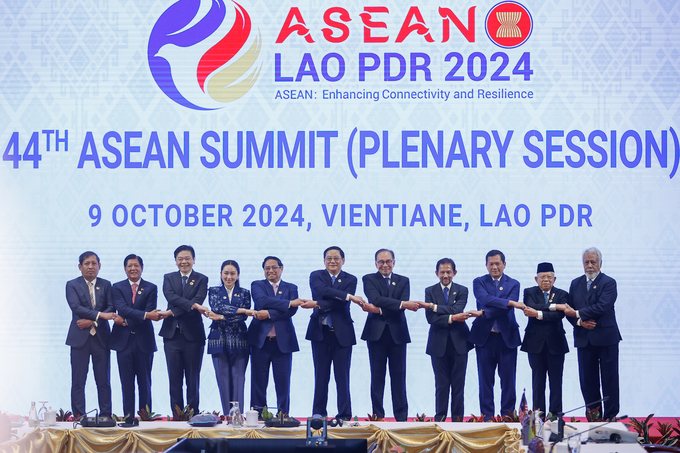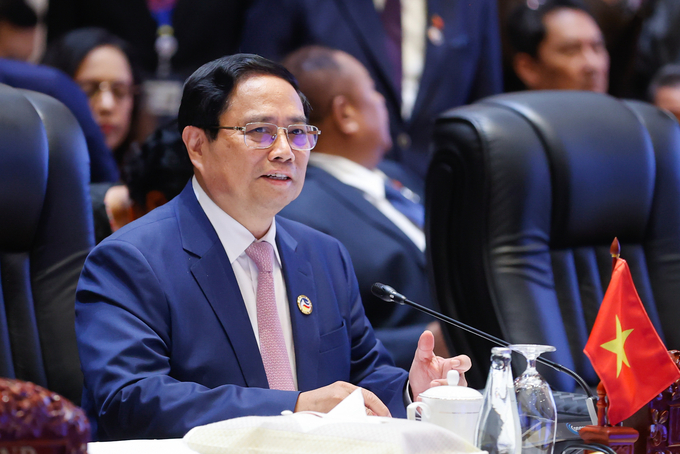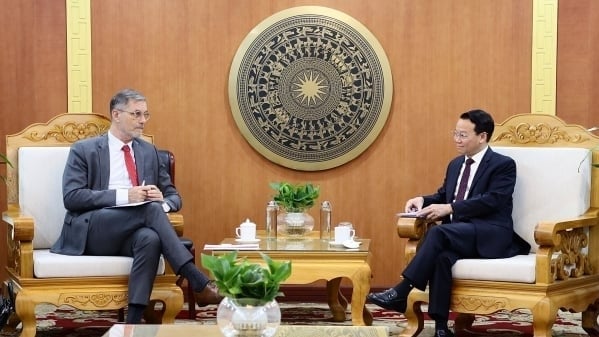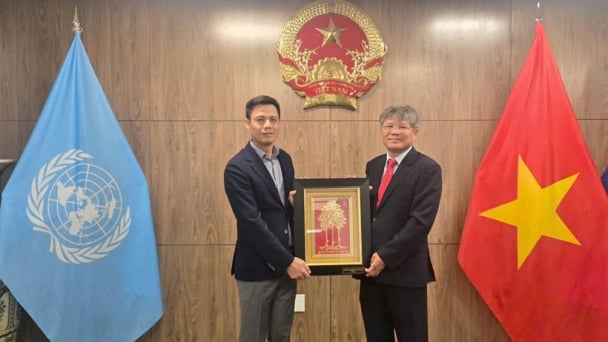May 21, 2025 | 22:27 GMT +7
May 21, 2025 | 22:27 GMT +7
Hotline: 0913.378.918
May 21, 2025 | 22:27 GMT +7
Hotline: 0913.378.918

Prime Minister Pham Minh Chinh, along with ASEAN leaders, at the ASEAN Summit. Photo: VGP.
ASEAN officially opened its 44th and 45th Summits and related meetings at the National Convention Center in Vientiane, the capital of the Lao People’s Democratic Republic, on the morning of October 9. The event saw the participation of leaders from ASEAN countries and Timor-Leste, as well as numerous representatives from international and regional partners and organizations. Prime Minister Pham Minh Chinh led the high-level Vietnamese delegation to the opening ceremony.
In his remarks at the summit, Prime Minister Pham Minh Chinh expressed his gratitude for the shared sentiments and support of ASEAN member states in addressing the aftermath of Super Typhoon Yagi. The typhoon has caused significant damage to several countries within the region, including Vietnam. The Prime Minister emphasized that solidarity and mutual assistance, embodied by the principle "one for all, and all for one," remain the core values and source of ASEAN’s strength.
Against the backdrop of an increasingly volatile world, Prime Minister Chinh noted that, despite the current peaceful state of global politics, local conflicts and tensions continue to affect all countries around the world. In response to this challenging context, ASEAN has maintained its status as a global economic model, a bridge for dialogue and cooperation, and a key player in regional integration and connectivity processes. Emerging frameworks such as the digital economy, blue ocean economy, and circular economy are gradually shaping new avenues for regional cooperation.
Expressing his support for the 2024 ASEAN theme of "Advancing Connectivity and Resilience," the Prime Minister emphasized that ASEAN must prioritize resilience as a foundation for growth, connectivity as a focal point for breakthroughs, and innovation as the driving force for leadership.
Building on this approach, Prime Minister Pham Minh Chinh outlined several key directions for ASEAN in the immediate future as follows:
First, strategic resilience and autonomy are essential foundations for ASEAN to withstand global disruptions and overcome challenges. Accordingly, ASEAN must bolster solidarity and unity in diversity, uphold its established norms of conduct, and strictly adhere to its principled stance on international and regional issues. ASEAN needs to strengthen its resilience and leverage internal resources to ensure strategic stability and respond swiftly to external risks. The Prime Minister expressed confidence that Timor-Leste’s accession as a full member will enhance ASEAN’s resilience and strengthen the region.
The Prime Minister also emphasized that ASEAN must maintain its central, independent, and balanced role while acting with principles in managing external relations. Furthermore, it should broaden and diversify relations with partners based on effectiveness, substance, and mutual benefit.

Prime Minister Pham Minh Chinh delivers remarks at the plenary session of the ASEAN Summit. Photo: VGP.
Second, promoting internal and external connectivity, public-private partnerships, and multi-sectoral connections with a focus on infrastructure, institutions, and people is a strategic breakthrough for ASEAN. Accordingly, ASEAN must prioritize investment in high-quality infrastructure, with an emphasis on both "hard" and "soft" strategic infrastructure. Moreover, it must encourage third-party cooperation and engagement with external partners. ASEAN should focus on establishing a strong connection between various institutions to facilitate trade in goods, services, and investment. The bloc must also strengthen people-to-people connectivity, encourage cultural exchanges, and further simplify travel for citizens, businesspeople, and workers.
Third, innovation is the key driver for ASEAN to maintain its pace and surpass regional and global developments. With this goal in mind, ASEAN must enhance cooperation in developing an innovation ecosystem and establish regional digital cooperation frameworks, alongside setting governance standards for emerging technologies, including artificial intelligence. The region must also utilize human capital as the central factor, driver, and resource for innovation. As a result, ASEAN should prioritize cooperation in education and the development of high-quality human resources to meet the demands of the new era.
Prime Minister Pham Minh Chinh reiterated that ASEAN is currently preparing for a new phase of development with a fresh mindset, new vision, renewed motivation, and a forward-looking approach. With the aim of further contributing to regional cooperation, the Prime Minister announced that Vietnam will continue to host the ASEAN Future Forum in 2025 and expressed hope for continued support from member states to ensure the event's success.
During the event, the Prime Minister also reaffirmed Vietnam's support for Malaysia in its role as ASEAN Chair in 2025 and its commitment to achieving new milestones as ASEAN approaches the 10th anniversary of its Community.
Translated by Nguyen Hai Long

(VAN) On May 21, Minister of Agriculture and Environment Do Duc Duy worked with Mr. Olivier Brochet, Ambassador Extraordinary and Plenipotentiary of the French Republic to Vietnam.

(VAN) VRG recently conducted a visit and working trip to the United States to demonstrate its efforts in redefining the role of rubber enterprises in the global value chain.

(VAN) In 2024, over 295 million people across 53 countries and territories faced acute hunger—an increase of almost 14 million people compared to 2023, while the number of people facing catastrophic levels of hunger reached a record high.

(VAN) World Environment Day 2025 (June 5) carries the theme 'Beat Plastic Pollution' continuing to emphasize the global urgency of addressing the plastic waste crisis.

(VAN) This was the assessment shared by experts at the workshop titled 'Assessing the Role and Potential of Low-Emission Rice Production Systems in Vietnam,' held on the morning of May 19.

(VAN) Cai Rong Port is the fisheries control center of Quang Ninh, helping to monitor fishing vessels, combat IUU fishing, and remove the EC's 'yellow card'.

(VAN) The German Agricultural Society (DLG) explores the possibility of establishing a mechanization service center in Vietnam’s Mekong Delta to support farmers in accessing and utilizing advanced machinery.